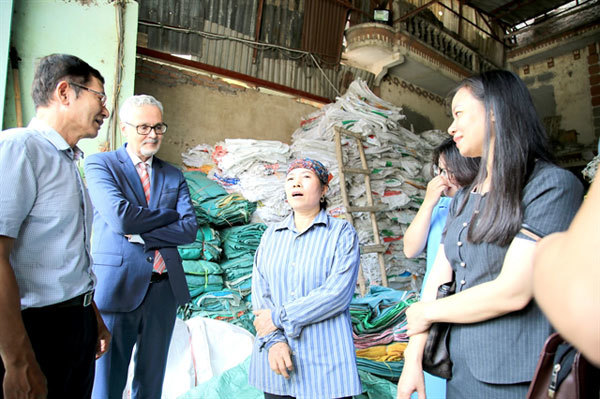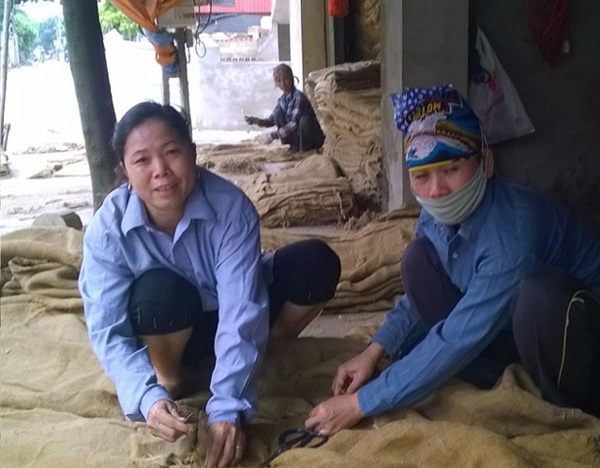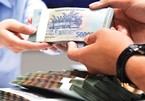when the institution opened its branch in 2008.
 |
| Nguyen Thi Luyen (central), owner of a jute bag making establishment in Yen Phong District, Bac Ninh Province tells her business to Germany ambassador to Vietnam Guido Erpo Hildner (second from left) during his visit to her workshop last week. — Photo Courtesy of TYM |
With a loan of VND4 million (US$172) for 100 weeks, Luyen and her husband opened a jute bag making workshop – a goal that they had had for years but were unable to realise due to a lack of finance.
Since then, every week, she visited the TYM branch to make a principal payment of VND40,000 and interest of VND9,600. After repaying the first loan, she applied for and received more loans. Luyen is now eligible to borrow VND50 million, the maximum loan TYM offers members.
Luyen said that before 2008, she and her husband mostly earned a living from farming.
“We worked hard but what we earned was just enough to feed our family and send our children to school,” she said, adding that when they or their children got sick, they had to borrow money from their relatives for medicine.
“At that time, we did not have any savings to start a business,” she said.
After receiving the modest loan from TYM in 2008, Luyen’s family invested in their business to make jute bags.
“With capital in our hands, we still faced other difficulties, particular in balancing costs, labour costs, finding consumers, meeting market demands and taking care of our children,” she said.
“As a solution for such problems, my husband was responsible for delivering products to customers and instructing workers while I was responsible for paperwork, receiving orders and buying input materials,” Luyen said.
“When my husband delivered products to buyers, he would get their feedback and then adjust our products to meet their tastes,” Luyen said.
Luyen’s business improved and she provided jute bags to neighbouring communes of Trung Dung, Nghia Tho, Van Mon and other districts like Tu Son, Tien Du and then, to other provinces like Bac Giang and Hanoi also.
The family workshop was expanded, creating jobs for all members of the family and other local residents.
Now, she employs regular 15 workers and six seasonal workers with an average monthly salary of VND3 million ($130).
“Thanks to accessing to TYM’s loans, we can be proactive in our trade and production,” she said, adding that with TYM’s mechanism that allows amortisation encouraged borrowers to work harder.
In 2014, Luyen was recognised as an outstanding microfinance client with a sustainable production model under a programme funded by Citi Foundation.
TYM originated from the Tình Thương fund launched by the Vietnam Women’s Union in 1992 to aid the Government’s hunger elimination and poverty reduction programme while improving women’s status within and outside the home.
TYM provides loans or microfinance for low-income people, many of them poor and vulnerable women. TYM also helps to collect its members' savings which are sent daily, weekly or monthly and can be withdrawn at any time. Last year, it received more than VND1.6 trillion ($69 million) in savings.
According to TYM, between 1992 and 2019, it had handed out more than 1.3 million loans worth VND14 trillion ($604.5 million) to nearly 170,000 clients. The repayment rate of the loans is 99.99 per cent, according to TYM.
Visiting Luyen’s workshop last week, German ambassador to Vietnam Guido Hildner said Vietnamese women played important roles in their families and society.
 |
| Nguyen Thi Luyen (left) borrowed loans to start a business on making jute bags since 2008. — Photo Courtesy of TYM |
“The women need multifaceted assistances to improve their abilities, particularly financial assistance for economic activities,” he said, adding that microfinance was an effective channel for women, especially those in rural or remote disadvantaged areas, to access financial services.
For years, German’s Federal Ministry of Economic Co-operation and Development, Savings Banks Foundation for International Co-operation have helped the Vietnam Women’s Association and TYM with microfinance activities.
Under a regional project strengthening regional microfinance networks in former Indochina and Myanmar, German helped TYM provide financial education classes for women, improve the institutional ability of the organisation through digitalisation, increase staff ability as well as expand co-operation among microfinance institutions in the region.
The ambassador said he hoped such assistance was helpful for Vietnamese women.
Going with the ambassador to visit two TYM clients in Bac Ninh Province, Vice Head of Vietnam Women’s Association Do Thi Thu Thao said that TYM had increased its ability and became the first official microfinance institution in Vietnam.
Last year, TYM was recognised as one of the top 10 financial institutions in the world with best practices in increasing the resilience of communities vulnerable to the effects of climate change under the framework of the European Microfinance Award 2019 'Strengthening Resilience to Climate Change' (EMA 2019).
The award was organised by the European Microfinance Platform (e-MFP), the Luxembourg Ministry of Foreign and European Affairs, and the Inclusive Finance Network Luxembourg (InFiNe.lu), in co-operation with the European Investment Bank (EIB).
TYM offers tailor-made products and services, for example, loans are provided without collateral requirements, loans are disbursed quickly and require simple procedures.
Loans' sizes are small for poor women. Clients can open savings accounts with minimal capital.
Among TYM’s clients, 120,000 women have escaped from poverty and 7,000 women have become micro-entrepreneurs. VNS

Selling online: new opportunity for VN micro businesses
The ‘e-commerce wave’ has opened a new consumption trend in which anyone can create a platform of their own to start a business.

Businesses can't access loans, banks see slow credit growth
Businesses are expecting interest rates to continue to fall, while banks’ credit growth continues to stand still or declines because of low credit demand.
 Nguyen Thi Luyen, 49 years old, of Yen Phong District in the northern province of Bac Ninh was among first borrowers from Tình thương One Member Limited Liability Microfinance Institution (TYM) in her hometown
Nguyen Thi Luyen, 49 years old, of Yen Phong District in the northern province of Bac Ninh was among first borrowers from Tình thương One Member Limited Liability Microfinance Institution (TYM) in her hometown